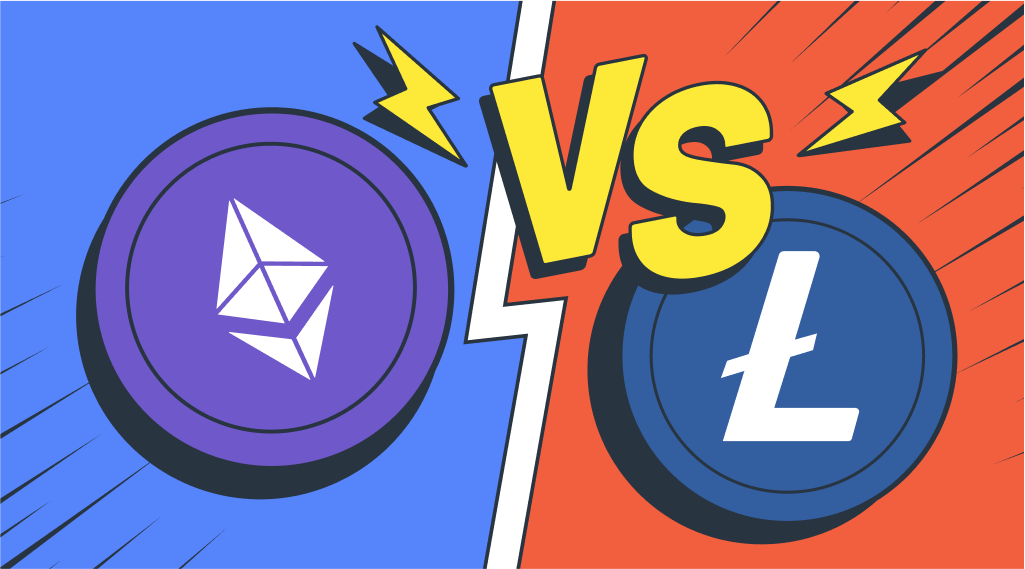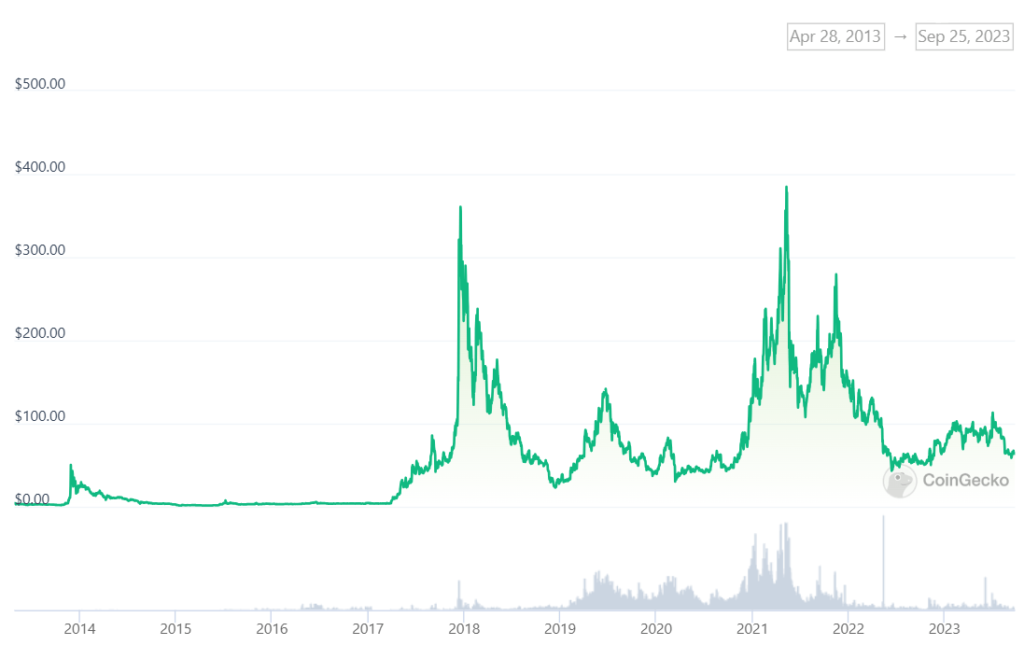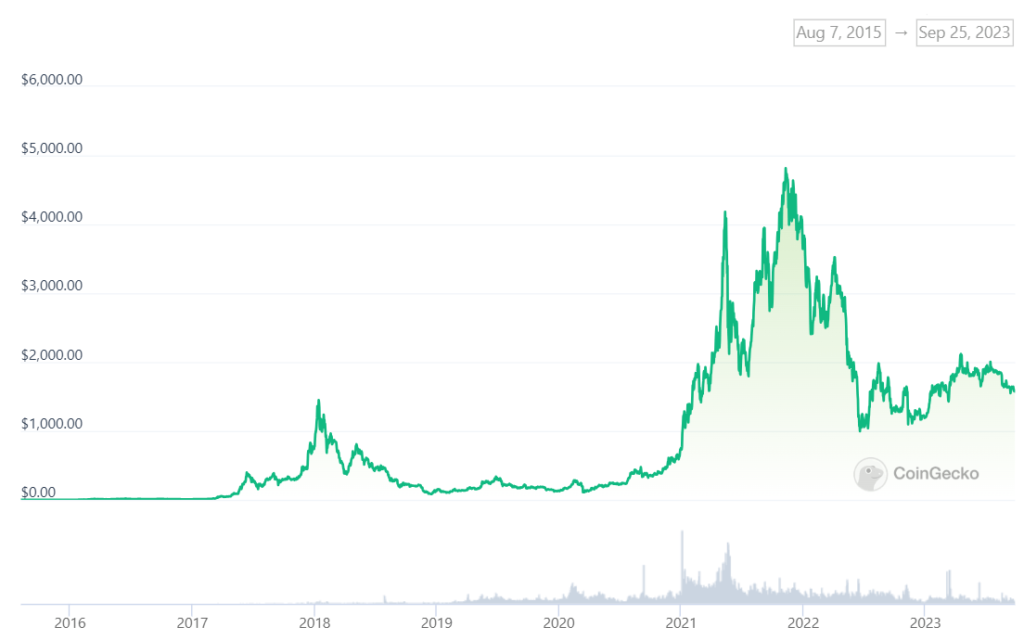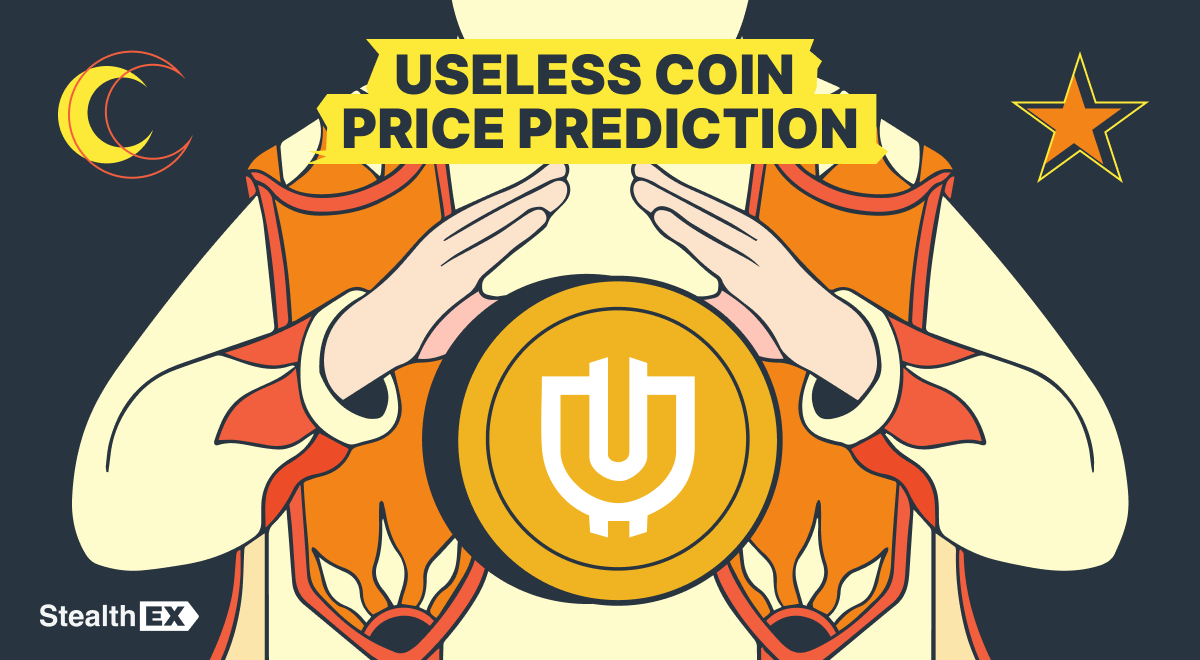Litecoin vs Ethereum: Which Crypto to Choose? LTC & ETH

Litecoin vs Ethereum: LTC and ETH are two of the most prominent cryptocurrencies. While both have garnered significant attention and adoption, they serve different purposes and have distinct technical foundations. Litecoin, often called the silver to Bitcoin’s gold, primarily functions as a digital currency. On the other hand, Ethereum is a cryptocurrency and a platform for decentralized applications powered by its native token, ETH. Despite their differences, both have played pivotal roles in advancing the broader cryptocurrency movement. This article delves into the key differences and similarities between Litecoin and Ethereum, offering a comprehensive comparison. Whether you’re a seasoned crypto enthusiast or a newcomer, understanding these two giants will enrich your perspective on the crypto ecosystem. But let’s start with a quick explanation of Litecoin and Ethereum.

Article contents
- 1 What Is Litecoin (LTC)?
- 2 What Is Ethereum (ETH)?
- 3 Litecoin vs Ethereum – Key Differences Between LTC and ETH
- 4 LTC vs ETH – Key Similarities
- 5 Litecoin vs Ethereum – Highest Price Ever – ATH (All-Time High)
- 6 FAQ – Litecoin vs Ethereum
- 6.1 What Are Litecoin and Ethereum?
- 6.2 How Do Litecoin and Ethereum Differ in Terms of Their Primary Purpose?
- 6.3 Which One Is Faster in Terms of Transaction Speed?
- 6.4 Are Both Litecoin and Ethereum Decentralized?
- 6.5 Can I Create DApps on Litecoin?
- 6.6 Which One Is More Secure?
- 6.7 How Do Their Market Capitalizations Compare?
- 6.8 Can I Mine Both Litecoin and Ethereum?
- 6.9 Which One Has a Brighter Future?
- 7 Summary
What Is Litecoin (LTC)?
Litecoin, often referred to as “the silver to Bitcoin’s gold,” is a decentralized cryptocurrency created in October 2011 by Charlie Lee, a former Google engineer. It emerged as an alternative to Bitcoin, aiming to address some of its perceived limitations. While Litecoin operates on a similar blockchain technology as Bitcoin, it boasts a few distinct features.
The primary difference is its shorter block generation time, approximately 2.5 minutes, compared to Bitcoin’s 10 minutes. This allows for faster transaction confirmation. Additionally, Litecoin employs a different hashing algorithm called Scrypt, as opposed to Bitcoin’s SHA-256. This choice was made to democratize LTC mining process, making it more accessible to individual miners using consumer-grade hardware.
LTC is the native cryptocurrency token of the Litecoin network. It serves as a medium of exchange, allowing users to conduct transactions or store value. Just like Bitcoin has BTC, Litecoin’s currency code is LTC. With a capped supply of 84 million coins, LTC’s scarcity is one of its value propositions, ensuring that only a finite number of coins will be in circulation. Today, Litecoin remains one of the top cryptocurrencies by market cap.
What Is Ethereum (ETH)?
Ethereum, conceived in 2013 by programmer Vitalik Buterin, is a decentralized platform that enables the creation and execution of smart contracts and decentralized applications (dApps) without downtime, fraud, control, or interference from a third party. Unlike Bitcoin, which was designed primarily as a digital currency, Ethereum’s primary function is to serve as a platform upon which these smart contracts and dApps can run.
The Ethereum blockchain is powered by its native Ether (ETH) cryptocurrency. While Ether can be used as a medium of exchange, like other cryptocurrencies, its primary purpose within the Ethereum ecosystem is to facilitate and incentivize the computational processes of the Ethereum network. When users want to execute certain operations on the Ethereum platform, they need to spend Ether as a form of “gas” to compensate for the computational energy required.
Furthermore, Ethereum introduced the “Initial Coin Offerings” (ICOs)”, a fundraising mechanism where new projects sell their underlying tokens in exchange for Ether. This innovation has led to an explosion of new blockchain projects and tokens.
Today, Ethereum is the second-largest cryptocurrency by market cap and remains a cornerstone of the broader crypto and decentralized finance (DeFi) ecosystems.
Litecoin vs Ethereum – Key Differences Between LTC and ETH
As we already mentioned, Litecoin (LTC) and Ethereum (ETH) are two of the most popular cryptocurrencies in the world. While both have significantly impacted the crypto space, they differ distinctly in purpose, technology, and use cases. Let’s check the key differences between these two digital assets.
Purpose and Vision
- Litecoin (LTC): Created by Charlie Lee in 2011, Litecoin was designed as a “silver” to Bitcoin’s “gold.” It was primarily created to offer a faster, more scalable alternative to Bitcoin. Litecoin is mainly used for peer-to-peer transactions and as a store of value.
- Ethereum (ETH): Launched by Vitalik Buterin in 2015, Ethereum’s primary purpose is not just to be a digital currency. Instead, it provides a platform for developers to build decentralized applications (DApps) using smart contracts. This makes Ethereum more versatile in terms of its applications.
Technology
- Litecoin (LTC): Litecoin uses the Scrypt algorithm for its proof-of-work consensus mechanism. This makes it different from Ethereum
- Ethereum (ETH): Ethereum’s unique proposition is the Ethereum Virtual Machine (EVM), which executes smart contracts. Ethereum transitioned from a proof-of-work to a proof-of-stake consensus mechanism with its Ethereum 2.0 upgrade.
Transaction Speed and Fees
- Litecoin (LTC): Litecoin transactions are faster than Ethereum’s due to its shorter block generation time. Transaction fees are also generally lower, making it more suitable for regular transactions.
- Ethereum (ETH): Ethereum’s transaction speeds vary depending on network congestion. However, the upcoming upgrades aim to address these issues.
Market Cap and Adoption
- Litecoin (LTC): Litecoin has consistently remained in the top cryptocurrencies in terms of market cap. Its adoption as a payment method has been growing.
- Ethereum (ETH): Ethereum’s market cap is significantly higher than Litecoin’s, ranking second after Bitcoin. Its wide range of use cases, especially in the DeFi space, has led to massive adoption.
Choose StealthEX for Exchange and Buy Crypto
- User-Friendly — Simple and minimalistic interface for everyone.
- Fast and Private — Instant non-custodial cryptocurrency exchanges.
- Buy crypto with Credit Card.
- 1400+ coins and tokens are available for limitless, quick and easy exchanges.
- NO-KYC crypto exchanges — Buy cryptocurrency up to €700 without KYC!
- StealthEX crypto exchange app — Process crypto swaps at the best rates wherever you are.
- 24/7 Customer Support.
Earn from Each Exchange by Joining StealthEX Affiliate Program.
Become a partner right now and use affiliate tools:
- Public API — Earn from your wallet, aggregator, or exchange terminal.
- Referral Links — Recommend StealthEX to your audience.
- Exchange Widget — Built crypto exchange widget on any page of your website.
- Button — A perfect choice for traffic monetization.
- Banner — Track conversion and stats right in the personal cabinet.
| Feature | Litecoin (LTC) | Ethereum (ETH) |
| Purpose | Digital Currency | Platform for DApps and Smart Contracts |
| Launch Year | 2011 | 2015 |
| Creator | Charlie Lee | Vitalik Buterin |
| Algorithm | Proof-of-Work | Proof-of-Stake |
| Block Time | 2.5 minutes | ~13 seconds (varies) |
| Main Use Case | Peer-to-peer transactions | Decentralized Applications (DApps) |
| Transaction Fees | Generally lower | Can be high during network congestion |
| Market Capitalizatio | Lower than Top 10 | Top 2 |
LTC vs ETH – Key Similarities
While ETH and LTC have distinct differences, they also share several similarities. Let’s explore the commonalities between these two digital assets.
- Decentralization – Both Litecoin and Ethereum operate on decentralized networks. This means that no central authority or institution governs or controls the currency. Instead, transactions and issuance are based on cryptographic protocols.
- Proof-of-Work (PoW) – Initially, both Litecoin and Ethereum utilized the proof-of-work consensus mechanism. This means that transactions were verified, and new coins were minted through a process where miners solved complex mathematical problems. However, Ethereum already transitioned to a proof-of-stake (PoS) system with its Ethereum 2.0 upgrade.
- Open-Source Nature – Both Litecoin and Ethereum are open-source projects. This means that their source code is publicly available, allowing developers worldwide to contribute, review, and enhance the platforms.
- Finite Supply – Both cryptocurrencies have a cap on their total supply. Litecoin’s maximum supply is capped at 84 million LTC, while network participants determine Ethereum’s annual issuance rate. Since Ethereum 2.0, ETH become a deflationary asset.
- Exchange Availability – Litecoin and Ethereum are widely available on major cryptocurrency exchanges and can be swapped on StealthEX. This makes them easily accessible for trading and investment purposes.
- Community Support – Both Litecoin and Ethereum have strong and active communities. These communities play a crucial role in developing, adopting, and advocating their respective cryptocurrencies.
Litecoin vs Ethereum – Highest Price Ever – ATH (All-Time High)
Ethereum (ETH) and Litecoin (LTC) have both experienced meteoric rises since their inception, capturing the attention of investors and enthusiasts alike.
Litecoin (LTC) Price Chart

Litecoin’s ATH was reached during the 2021 crypto boom. At its peak, Litecoin’s price soared to an $410 per LTC, marking a significant milestone for the coin and its community.
Ethereum (ETH) Price Chart

Ethereum’s ATH was achieved in 2021 as well, driven by the rise of decentralized finance (DeFi) and non-fungible tokens (NFTs) that predominantly use the Ethereum platform. Ethereum’s price reached a staggering $4878, solidifying its position as a leading cryptocurrency.
FAQ – Litecoin vs Ethereum
What Are Litecoin and Ethereum?
Litecoin (LTC) is a peer-to-peer cryptocurrency that was created as a “lighter” version of Bitcoin. It offers faster transaction times and a different hashing algorithm. Ethereum (ETH), on the other hand, is not just a cryptocurrency but also a platform that allows developers to create and deploy decentralized applications (dApps) using smart contracts.
How Do Litecoin and Ethereum Differ in Terms of Their Primary Purpose?
While both Litecoin and Ethereum can be used for transactions, Ethereum’s primary purpose extends beyond that. Ethereum is designed to be a platform for dApps and smart contracts, whereas Litecoin primarily serves as a digital currency.
Which One Is Faster in Terms of Transaction Speed?
Litecoin typically has faster transaction confirmation times compared to Ethereum. However, the speed for Ethereum can vary based on network congestion and the gas price set by the sender.
Are Both Litecoin and Ethereum Decentralized?
Yes, both Litecoin and Ethereum operate on decentralized networks. However, the way they achieve consensus differs, with Litecoin using Proof-of-Work (PoW) and Ethereum Proof-of-Stake (PoS).
Can I Create DApps on Litecoin?
No, Litecoin is primarily a digital currency and does not support the creation of dApps or smart contracts. Ethereum is the platform designed for that purpose.
Which One Is More Secure?
Both Litecoin and Ethereum have robust security measures in place. However, the security of a cryptocurrency also depends on factors like its hashing algorithm, consensus mechanism, and overall network size.
How Do Their Market Capitalizations Compare?
Market capitalizations for cryptocurrencies can fluctuate significantly. It’s best to check a reliable cryptocurrency market tracking website for the most up-to-date figures.
Can I Mine Both Litecoin and Ethereum?
No, only Litecoin can be mined. Ethereum transitioned to PoS consensus mechanism, which phased out traditional mining.
Which One Has a Brighter Future?
The future of any cryptocurrency is speculative and depends on various factors including technological developments, market adoption, regulatory changes, and more. Both Litecoin and Ethereum have strong communities and have shown resilience over the years.
Summary
Litecoin (LTC) and Ethereum (ETH) are two prominent cryptocurrencies with distinct purposes and technologies. While Litecoin was designed as a faster alternative to Bitcoin for peer-to-peer transactions, Ethereum serves as a platform for decentralized applications using smart contracts. Both operate on decentralized networks and both have achieved impressive all-time high prices, reflecting their significant roles in the crypto market. Despite their differences, both have strong community support and are widely available on major exchanges.
Follow us on Medium, Twitter, Telegram, YouTube, and Publish0x to stay updated about the latest news on StealthEX.io and the rest of the crypto world.
This article is not supposed to provide financial advice. Digital assets are risky. Be sure to do your own research and consult your financial advisor before investing.
Recent Articles on Cryptocurrency
 Useless Coin Price Prediction: Is USELESS Crypto a Good Investment?
Useless Coin Price Prediction: Is USELESS Crypto a Good Investment?  OFFICIAL TRUMP Coin Price Prediction: How High Will TRUMP Crypto Go?
OFFICIAL TRUMP Coin Price Prediction: How High Will TRUMP Crypto Go? 